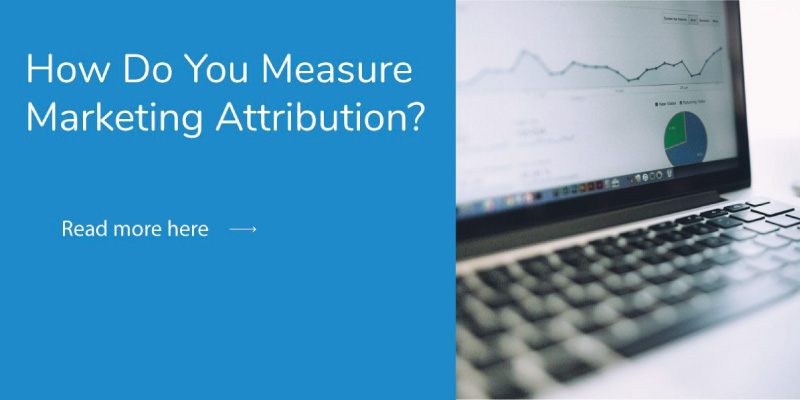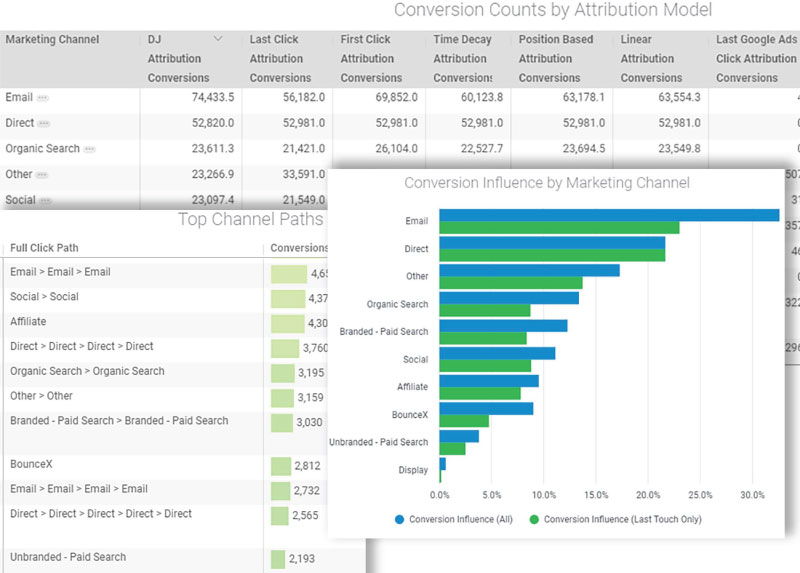How Do You Measure Marketing Attribution?
June 25, 2020 •DJ Team
 Marketing professionals measure leads, conversions and ROI using attribution models, such as single-touch, last-touch or linear attribution. A custom attribution model takes into account a company’s unique product offerings and sales pipeline.
Marketing professionals measure leads, conversions and ROI using attribution models, such as single-touch, last-touch or linear attribution. A custom attribution model takes into account a company’s unique product offerings and sales pipeline.
Company leaders want to learn what marketing tactics provide the highest return on ad spend so they can do more of the same; it’s that simple. But measuring marketing attribution can frustrate even the most experienced marketers.
With so many different attribution models, platforms and providers to choose from and track, marketing professionals sometimes struggle to find the right mix of analytics to collect and eliminate wasted spend.
Which Attribution Model Should I Use?
Choosing the right attribution model can depend on the sophistication level of that company’s marketing efforts. One example is the last-click attribution model. In this attribution model, all conversion credit gets assigned to a user’s last interaction with a business.
For some businesses, this is enough. Take a small airport taxi service for example. Their whole business model could be airport taxi rides, meaning they would only need to bid on branded search terms. For them, a last-click attribution model would suffice.
But with more complex marketing efforts that involve multiple customer touch points, advertising may be placed on Google Shopping, Facebook, Instagram and the audience display network. Measuring the effectiveness of each channel requires a multi-touch attribution model, such as linear, position-based or time decay attribution.
Even though a multi-touch attribution model provides a much clearer picture of how advertisements convert to revenue, marketers often remain left in the dark on how to analyze their data and create a clear roadmap for the future.
For example, business leaders see credit assigned to each touchpoint, but may not understand which pieces of content intrigued the user and actually influenced their path to purchase. Marketers are still tasked with distilling all of that data into customized consumer insights to allow for campaign optimizations that improve outcomes.
Partnering With The Right Attribution Provider
Breaking down data from many different attribution models and using those analytics to inform future campaigns requires a sophisticated attribution platform. There’s no one-size-fits-all solution.
“Listening to and learning from consumers can help a brand find or fine-tune its voice. Information gathered can then be used to create a meaningful experience for each customer,” states Think With Google. “By assigning value to all parts of the purchase funnel — from research to last click and beyond — a brand can endeavor to serve the right ad or experience at the right time to all of its customers.”
DemandJump provides data-driven attribution services, or algorithmic attribution. This approach goes further than dividing revenue across the many touch points in the customer journey. It analyzes thousands of digital paths of converters and non-converters to assign probabilities of success based on previous actions taken. This gives a more accurate view of which channels possess the greatest potential to influence conversions, no matter their position in the sales funnel.
In a hypothetical example, algorithmic machine learning could find that if someone discovers your business through organic search, there’s a 95% chance they will return and purchase through direct traffic. There’s a 5% chance they will return and purchase through an affiliate link. It uses the paths’ probabilities to assign value to marketing channels based on their chance to convert in the future.
DemandJump’s attribution services also allow for cross-channel analysis, which provides marketing teams with an in-depth look at each channel and its corresponding algorithmic marketing attribution.

Want to know which top- and bottom-funnel marketing tactics lead users to convert on your company’s website? Request a demo or try DemandJump free for 7 days - see just how easy it can be.
Featured Articles
Categories
- Attribution Tracking (13)
- Channel Optimization (11)
- Consumer Insights (68)
- Content Marketing (251)
- Data Science (8)
- Digital Marketing (6)
- Digital Transformation (26)
- Enterprise (10)
- Lead Generation (14)
- Market Intelligence (8)
- Marketing Analytics (39)
- Marketing Attribution (57)
- Marketing Management (153)
- Marketing Operations (86)
- Organic Search (222)
- Paid Search (52)
- Pillar-Based Marketing (63)
- Programmatic Advertising (9)
- SaaS Content (14)
- SaaS Marketing (29)
- Search Marketing (111)
- SEO Keyword Research (28)
- SEO Pillar (18)
- SEO Strategy (46)
- SMB (5)
- Website Content (12)


